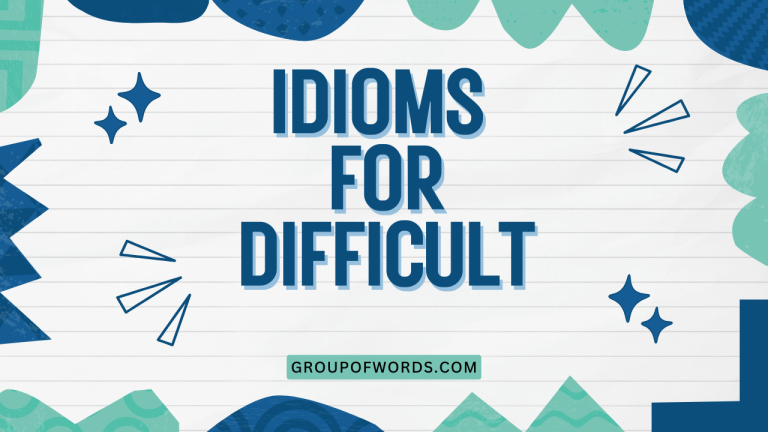Idioms About Books: Unlocking Figurative Language
Idioms are a fascinating aspect of the English language, adding color and depth to our communication. Among the vast array of idioms, those related to books offer a unique glimpse into how we perceive knowledge, learning, and stories.
Understanding these idioms not only enhances your comprehension of English but also allows you to express yourself more creatively and effectively. This article delves into the world of book-related idioms, exploring their meanings, origins, and usage, making it an invaluable resource for English language learners of all levels.
Whether you’re a beginner aiming to grasp basic conversational phrases or an advanced learner seeking to refine your linguistic skills, this guide will provide you with the necessary tools to master idioms about books. By the end of this article, you will be able to recognize, interpret, and confidently use these idioms in various contexts, enriching your understanding and appreciation of the English language.
Table of Contents
- Definition of Idioms About Books
- Structural Breakdown of Book Idioms
- Types and Categories of Book Idioms
- Examples of Book Idioms
- Usage Rules for Book Idioms
- Common Mistakes with Book Idioms
- Practice Exercises
- Advanced Topics in Book Idioms
- Frequently Asked Questions
- Conclusion
Definition of Idioms About Books
An idiom is a phrase or expression whose meaning cannot be understood from the literal meanings of its individual words. Instead, it has a figurative meaning known through common usage.
Idioms about books are a subset of these expressions that use the concept of books—their physical attributes, contents, or associated activities like reading and writing—to convey a particular idea or feeling. These idioms often relate to knowledge, stories, character, or learning.
Idioms are crucial in English because they add nuance and color to communication. They allow speakers to express complex ideas in a concise and memorable way.
For language learners, mastering idioms is essential for achieving fluency and understanding native speakers, who frequently use them in everyday conversation. Book idioms, in particular, provide insights into how English speakers view knowledge and stories.
Classification: Book idioms can be classified based on their thematic focus. Some relate to the acquisition of knowledge, others to the structure and content of narratives, and still others to the qualities of people or situations as analogous to books or their elements. For example, “to hit the books” refers to studying, while “judging a book by its cover” refers to making superficial judgments.
Function: The primary function of book idioms is to convey meaning beyond the literal. They serve to enrich communication by adding layers of connotation and emotional resonance. They also reflect cultural values and attitudes towards learning, storytelling, and personal development.
Contexts: Book idioms are used in a wide range of contexts, from casual conversations to formal writing. They appear in literature, journalism, academic discourse, and everyday speech. Understanding the context is crucial for interpreting the intended meaning of an idiom correctly.
Structural Breakdown of Book Idioms
The structure of book idioms can vary, but they generally involve a metaphorical comparison between a real-world concept and an aspect of books. This comparison is what gives the idiom its unique meaning.
Understanding the structural elements can help in deciphering unfamiliar idioms and using them effectively.
Components: Most book idioms consist of a few key components: a literal element (related to books), a figurative element (the intended meaning), and a connecting element (the implied comparison). For instance, in the idiom “an open book,” the literal element is a book that is open, the figurative element is a person who is easy to understand, and the connecting element is the idea that, like an open book, the person’s thoughts and feelings are readily visible.
Patterns: Some common patterns in book idioms include:
- Verbal phrases: These involve verbs that describe actions related to books, such as “hit the books” or “read between the lines.”
- Nominal phrases: These use nouns related to books to describe people or situations, such as “a closed book” or “a page-turner.”
- Adjectival phrases: These use adjectives to describe qualities associated with books, such as “by the book” or “textbook example.”
Rules: The grammatical rules governing book idioms are the same as those for other types of phrases. However, it’s important to remember that idioms are fixed expressions, meaning their word order and form cannot be altered without changing or losing their meaning. For example, you can’t say “hitting the books” and expect it to have the same idiomatic meaning as “hit the books.”
Types and Categories of Book Idioms
Book idioms can be categorized based on their primary thematic focus. This categorization helps in understanding the different aspects of life and knowledge that these idioms represent.
Idioms About Knowledge and Learning
These idioms relate to the acquisition, understanding, and application of knowledge. They often use the metaphor of reading or studying to represent learning processes.
Idioms About Stories and Narratives
These idioms focus on the structure, content, and impact of stories. They may describe the plot, characters, or overall quality of a narrative.
Idioms About Character and Personality
These idioms use the analogy of books to describe people’s traits, behaviors, and level of openness. They often compare individuals to different types of books or literary characters.
Examples of Book Idioms
This section provides a comprehensive list of book idioms, categorized by their thematic focus. Each idiom is accompanied by its meaning and example sentences to illustrate its usage.
Idioms About Knowledge and Learning
These idioms are essential for discussing academic pursuits, skill development, and intellectual growth. Understanding them can help you express ideas related to learning in a vivid and engaging way.
The following table provides examples of idioms related to knowledge and learning.
| Idiom | Meaning | Example Sentence |
|---|---|---|
| Hit the books | To study hard | I have a big exam tomorrow, so I need to hit the books tonight. |
| By the book | According to the rules | The accountant always does everything by the book to avoid any legal issues. |
| Read up on | To research a topic | Before traveling to Japan, I need to read up on their culture and customs. |
| Cover a lot of ground | To discuss or learn a great deal | The lecture covered a lot of ground, from ancient history to modern technology. |
| Learn a thing or two | To gain some knowledge | After working on that project, I learned a thing or two about project management. |
| Take a leaf out of someone’s book | To imitate someone’s behavior | I decided to take a leaf out of her book and start waking up early to exercise. |
| Know something inside and out | To know something very well | She knows that software inside and out, so she’s the best person to ask. |
| An open book | Easy to understand | His emotions are always on display; he’s such an open book. |
| A closed book | Difficult to understand | Quantum physics is a closed book to me; I can’t make heads or tails of it. |
| In my book | In my opinion | In my book, honesty is the most important quality a person can have. |
| Go by the book | Follow the rules strictly | The new manager insists that everyone go by the book and adhere to company policy. |
| Cook the books | Falsify financial records | The CFO was caught cooking the books to hide the company’s losses. |
| Bring someone to book | To punish or reprimand someone | The company decided to bring the employee to book for violating the code of conduct. |
| Like a broken record | Repeating the same thing over and over | He sounds like a broken record when he keeps complaining about the same problem. |
| Turn over a new leaf | To start behaving in a better way | After his mistake, he promised to turn over a new leaf and work harder than ever. |
| Every trick in the book | All possible methods | The salesman used every trick in the book to try to convince me to buy the car. |
| Speak volumes | To be very expressive or revealing | Her silence speaks volumes about her true feelings on the matter. |
| The oldest trick in the book | A very common and obvious trick | Trying to distract me with flattery is the oldest trick in the book. |
| You can’t judge a book by its cover | Don’t judge by appearances | He may look intimidating, but you can’t judge a book by its cover; he’s actually very kind. |
| On the same page | In agreement | Before we start the project, let’s make sure everyone is on the same page. |
| Out of the book | Unconventional or unusual | His ideas are so out of the book that nobody knows what to think of them. |
Idioms About Stories and Narratives
These idioms help describe the quality, plot, and impact of stories. They are useful in literary discussions, reviews, and everyday conversations about books, movies, or real-life events.
The following table provides examples of idioms related to stories and narratives.
| Idiom | Meaning | Example Sentence |
|---|---|---|
| A page-turner | A very exciting book | The new thriller was a real page-turner; I couldn’t put it down. |
| The plot thickens | The story becomes more complicated | As new evidence emerged, the plot thickened, and the detectives had to rethink their strategy. |
| A cliffhanger | An ending that leaves you in suspense | The movie ended on a cliffhanger, making everyone eager for the sequel. |
| Read between the lines | To understand the hidden meaning | You have to read between the lines to understand what he really means. |
| Write a new chapter | To start a new phase in life | After retiring, she decided to write a new chapter and travel the world. |
| Tell tales out of school | To reveal secrets | He told tales out of school about his colleagues, which caused a lot of trouble. |
| A storybook ending | A happy ending | After all their struggles, they finally got their storybook ending. |
| Turn the page | To move on from something | It’s time to turn the page and focus on the future. |
| Once upon a time | A traditional way to start a story | Once upon a time, there was a beautiful princess who lived in a castle. |
| As old as the hills | Very old | That joke is as old as the hills; I’ve heard it a million times. |
| A tall tale | An unbelievable story | He told a tall tale about how he caught a fish that was bigger than a car. |
| True to life | Realistic | The movie was very true to life, accurately portraying the struggles of everyday people. |
| The rest is history | The rest is well-known | He made the winning shot, and the rest is history; his team won the championship. |
| In a nutshell | Briefly | In a nutshell, the project was a success because of teamwork and dedication. |
| Long story short | To summarize a long story | Long story short, we got lost, but eventually found our way back home. |
| Make a long story short | To summarize | To make a long story short, I failed the test, but I will study harder next time. |
| Not the end of the world | Not a disaster | Failing one test is not the end of the world; you can always try again. |
| An open-and-shut case | A straightforward case | The evidence was so clear that it was an open-and-shut case. |
| That’s the story of my life | That’s typical for me | I spilled coffee on my shirt again; that’s the story of my life! |
| A chapter of accidents | A series of unfortunate events | The trip was a chapter of accidents, from missed flights to lost luggage. |
Idioms About Character and Personality
These idioms provide a figurative way to describe people’s traits, behaviors, and level of openness. They are useful in discussing personality, relationships, and social dynamics.
The following table provides examples of idioms related to character and personality.
| Idiom | Meaning | Example Sentence |
|---|---|---|
| Don’t judge a book by its cover | Don’t judge by appearances | He may look intimidating, but don’t judge a book by its cover; he’s actually very kind. |
| Take a page from someone’s book | To imitate someone’s behavior | I decided to take a page from her book and start waking up early to exercise. |
| An open book | Easy to understand | His emotions are always on display; he’s such an open book. |
| A closed book | Difficult to understand | Quantum physics is a closed book to me; I can’t make heads or tails of it. |
| By the book | According to the rules | The accountant always does everything by the book to avoid any legal issues. |
| Like a broken record | Repeating the same thing over and over | He sounds like a broken record when he keeps complaining about the same problem. |
| Turn over a new leaf | To start behaving in a better way | After his mistake, he promised to turn over a new leaf and work harder than ever. |
| Speak volumes | To be very expressive or revealing | Her silence speaks volumes about her true feelings on the matter. |
| Out of the book | Unconventional or unusual | His ideas are so out of the book that nobody knows what to think of them. |
| Cook the books | Falsify financial records | The CFO was caught cooking the books to hide the company’s losses. |
| Bring someone to book | To punish or reprimand someone | The company decided to bring the employee to book for violating the code of conduct. |
| Every trick in the book | All possible methods | The salesman used every trick in the book to try to convince me to buy the car. |
| The oldest trick in the book | A very common and obvious trick | Trying to distract me with flattery is the oldest trick in the book. |
| On the same page | In agreement | Before we start the project, let’s make sure everyone is on the same page. |
| Sing from the same hymn sheet | To be in agreement with someone | The board members need to sing from the same hymn sheet if they want the company to succeed. |
| Be a glutton for punishment | Enjoy doing something difficult or unpleasant | He must be a glutton for punishment to keep running marathons after all those injuries. |
| Get your wires crossed | To misunderstand something | We must have got our wires crossed because I thought the meeting was tomorrow. |
| Have your nose in a book | To be constantly reading | She always has her nose in a book; it’s hard to get her attention. |
| In black and white | In writing | I need the agreement in black and white before I can sign it. |
| Take as gospel | To accept something as completely true | He tends to take everything the teacher says as gospel. |
Usage Rules for Book Idioms
Using book idioms correctly requires understanding their specific meanings and contexts. Here are some rules to follow to ensure proper usage:
- Context is key: Always consider the context in which you are using the idiom. The same idiom can have different connotations depending on the situation.
- Fixed expressions: Idioms are generally fixed expressions, meaning their word order and form should not be altered. Changing the words can change or lose the meaning.
- Audience awareness: Be mindful of your audience. While idioms can add color to your language, they may not be appropriate in all situations, especially with those who are not native English speakers.
- Overuse: Avoid overuse of idioms. While they can enrich your language, too many idioms can make your speech sound unnatural or forced.
- Cultural sensitivity: Be aware that some idioms may have cultural or historical origins that are not universally understood or appreciated. Use them with sensitivity and avoid those that could be offensive.
Common Mistakes with Book Idioms
Many learners make common mistakes when using idioms. Here are some frequent errors and how to avoid them:
| Incorrect | Correct | Explanation |
|---|---|---|
| I will hit the books hardly. | I will hit the books hard. | “Hit the books” means to study intensively. The adverb “hard” is correct, not “hardly.” |
| Don’t judge a book from its cover. | Don’t judge a book by its cover. | The correct preposition is “by,” not “from.” |
| She is a open book. | She is an open book. | “Open” starts with a vowel sound, so the indefinite article “an” is required. |
| He told accounts out of school. | He told tales out of school. | The correct word is “tales,” meaning secrets or gossip. |
| They are on the similar page. | They are on the same page. | The correct word is “same,” indicating agreement. |
| The plot is thickening too much. | The plot thickens. | The idiom “the plot thickens” is a set phrase and doesn’t require additional modifiers like “too much.” |
| After the mistake, he promised to turn a new page. | After the mistake, he promised to turn over a new leaf. | The correct idiom is “turn over a new leaf,” not “turn a new page.” |
| That joke is old like the hills. | That joke is as old as the hills. | The correct idiom is “as old as the hills,” using “as” for comparison. |
| He has his nose in the novel. | He has his nose in a book. | The idiom is “have your nose in a book,” referring to reading in general, not a specific novel. |
| I need the agreement in black and white paper. | I need the agreement in black and white. | The correct phrase is “in black and white,” meaning in writing, without adding “paper.” |
Practice Exercises
Test your understanding of book idioms with these exercises. Fill in the blanks with the appropriate idiom from the list provided.
Idiom List: hit the books, by the book, read between the lines, a page-turner, don’t judge a book by its cover, on the same page, turn over a new leaf, speak volumes, once upon a time, the plot thickens
| Question | Answer |
|---|---|
| 1. I have a big exam tomorrow, so I need to _____________. | hit the books |
| 2. The new thriller was _____________; I couldn’t put it down. | a page-turner |
| 3. You have to ____________ to understand what he really means. | read between the lines |
| 4. He may look intimidating, but _____________; he’s actually very kind. | don’t judge a book by its cover |
| 5. Before we start the project, let’s make sure everyone is _____________. | on the same page |
| 6. After his mistake, he promised to _____________ and work harder than ever. | turn over a new leaf |
| 7. Her silence ____________ about her true feelings on the matter. | speak volumes |
| 8. The accountant always does everything ____________ to avoid any legal issues. | by the book |
| 9. As new evidence emerged, _____________, and the detectives had to rethink their strategy. | the plot thickens |
| 10. _____________, there was a beautiful princess who lived in a castle. | Once upon a time |
Exercise 2: Choose the correct idiom to complete each sentence.
| Question | Options | Answer |
|---|---|---|
| 1. After the scandal, the company needed to __________. | a) cook the books, b) burn the books, c) turn over a new leaf | c) turn over a new leaf |
| 2. The evidence was so clear that the case was __________. | a) an open-and-shut case, b) a closed book, c) a best-seller | a) an open-and-shut case |
| 3. She __________ and aced the exam. | a) hit the books, b) burned the midnight oil, c) wrote a new chapter | a) hit the books |
| 4. The new policy requires everyone to __________. | a) go by the book, b) read between the lines, c) turn the page | a) go by the book |
| 5. To __________, the project was a complete disaster. | a) in a nutshell, b) long story short, c) cut a long story short | a) in a nutshell |
| 6. He tends to __________ everything the teacher says. | a) take as gospel, b) read between the lines, c) speak volumes | a) take as gospel |
| 7. Her constant complaints are __________. | a) like a broken record, b) a tall tale, c) an open book | a) like a broken record |
| 8. I thought the meeting was today, but we must have __________. | a) read between the lines, b) got our wires crossed, c) turned over a new leaf | b) got our wires crossed |
| 9. The salesman used __________ to try to convince me to buy the car. | a) every trick in the book, b) a chapter of accidents, c) a storybook ending | a) every trick in the book |
| 10. His ideas are so __________ that nobody knows what to think of them. | a) by the book, b) out of the book, c) on the same page | b) out of the book |
Exercise 3: Match the idiom with its meaning.
| Idiom | Meaning | Answer |
|---|---|---|
| 1. By the book | a) To move on from something | 1-d |
| 2. Turn the page | b) Difficult to understand | 2-f |
| 3. Speak volumes | c) To start behaving in a better way | 3-h |
| 4. Hit the books | d) According to the rules | 4-g |
| 5. Don’t judge a book by its cover | e) A very exciting book | 5-j |
| 6. A closed book | f) To be very expressive or revealing | 6-b |
| 7. The plot thickens | g) To study hard | 7-i |
| 8. Turn over a new leaf | h) Don’t judge by appearances | 8-c |
| 9. A page-turner | i) The story becomes more complicated | 9-e |
| 10. Read between the lines | j) To understand the hidden meaning | 10-a |
Advanced Topics in Book Idioms
For advanced learners, exploring the nuances and origins of book idioms can provide a deeper understanding of their cultural significance. This includes studying the historical context in which these idioms arose, their variations in different dialects of English, and their use in literature and media.
Historical Context: Many book idioms have roots in historical practices related to reading, writing, and education. Understanding these origins can shed light on the idioms’ meanings. For example, “hit the books” likely originated from the physical act of hitting or tapping books to emphasize studying.
Dialectal Variations: Some book idioms may have variations in different dialects of English. For instance, an idiom common in British English might be less familiar in American English, and vice versa. Being aware of these variations can prevent misunderstandings.
Literary and Media Usage: Analyzing how book idioms are used in literature, movies, and other media can provide insights into their stylistic and rhetorical effects. Authors and speakers often use idioms to add depth, humor, or emphasis to their communication.
Frequently Asked Questions
This section addresses common questions that learners have about book idioms.
- What is the difference between an idiom and a proverb?
An idiom is a phrase whose meaning is not deducible from the literal meanings of the words, while a proverb is a short, well-known saying that expresses a general truth or piece of advice. Idioms are more figurative and context-dependent, whereas proverbs are more universal and didactic.
- How can I effectively learn and memorize book idioms?
Use flashcards, create example sentences, and practice using idioms in conversation. Reading extensively and paying attention to how idioms are used in context can also help. Additionally, try to associate each idiom with a memorable image or story.
- Are book idioms used differently in formal and informal settings?
Yes, some book idioms are more appropriate for informal settings, while others can be used in both formal and informal contexts. Be mindful of your audience and the overall tone of the communication when using idioms. Avoid overly casual or slangy idioms in formal situations.
- Can the meaning of a book idiom change over time?
Yes, the meanings of idioms can evolve over time due to cultural shifts and changes in language usage. It’s important to stay updated on the current meanings and connotations of idioms by consulting reliable dictionaries and language resources.
- What should I do if I don’t understand a book idiom?
Look it up in a dictionary or online resource that specializes in idioms. Pay attention to the context in which the idiom is used, and ask a native speaker for clarification if needed. Understanding the literal meanings of the words can sometimes provide clues to the idiom’s figurative meaning.
- Are there any book idioms that should be avoided because they are offensive or outdated?
Some idioms may have origins or connotations that are considered offensive or outdated. It’s important to be aware of the cultural and historical context of idioms and to avoid using those that could be insensitive or disrespectful. When in doubt, consult a language expert or cultural guide.
- How do I know when it is appropriate to use a book idiom?
Consider your audience, the context of the conversation, and the overall tone you want to convey. Idioms are most effective when they enhance communication and add color to your language. Avoid using them if they are likely to confuse or offend your audience.
- Can I create my own book idioms?
While it’s possible to create new expressions, they won’t be idioms until they gain widespread acceptance and usage. Idioms are established phrases that are recognized and understood by a community of speakers. Focus on learning and using existing idioms effectively before attempting to create new ones.
Conclusion
Mastering idioms about books is a valuable step towards enhancing your English language skills. These idioms provide a unique window into how English speakers perceive knowledge, stories, and character.
By understanding their meanings, origins, and usage rules, you can communicate more effectively and expressively.
Remember to practice using these idioms in various contexts, pay attention to how native speakers use them, and stay curious about the ever-evolving nature of language. With consistent effort and a keen ear, you’ll be able to confidently incorporate book idioms into your vocabulary and elevate your command of the English language.
Continue to explore the rich tapestry of English idioms, and you’ll discover that each one offers a unique perspective on the world. Happy learning!






